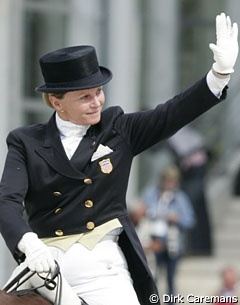
United States Equestrian Federation (USEF) Developing Dressage Coach Debbie McDonald came to Hamilton Farm for the second of three Developing Dressage Clinics this past weekend, June 12-13, 2010. Aiding the development of America's up and coming dressage riders, the two-day clinic led by McDonald provided important guidance and insight to the nine riders who were invited to participate based upon their potential to represent the United States in international competition.
McDonald's immense success in the realm of international dressage competition made her, "the only choice," Gribbons said of her decision to appoint McDonald as the USEF Developing Dressage Coach. Representing the United States, McDonald has a legendary list of accomplishments, some of which include a win at the 2003 FEI World Cup Final, and a Team Bronze medal at the 2004 Athens Olympic Games and the 2006 World Equestrian Games. Her knowledge and expertise are truly invaluable to the promising young riders and acquiring that knowledge at a facility as legendary and impressive as the USET Foundation's Hamilton Farm was truly a once in a lifetime opportunity for the nine talented riders.
Historically, the United States has had great success on the international stage, however, as USEF Dressage Technical Advisor Anne Gribbons explained, "Of everything we do right now, the Developing Clinics are probably the most important thing as they are all about the future and developing new Team members and new horses. We need to create depth in our Teams, because we have some great horses at the top, but we need more coming in after them and we want to be able to have more choices."
"I think where we have lacked a little bit in the past is not really trying to develop future combinations for the United States," McDonald added, "as some of our top horse and rider combinations are getting older, we are starting to realize that we need to be thinking about the future, which is why the Developing Clinics were created." She elaborated on one area of particular interest, saying, "The Talent Search, especially, is about finding people who might not be on a list or have gone to championship, but who are very promising and discovering them, giving them a path to follow, a plan for future, and if they don't have sponsors, finding them a way to go ahead and continue on that path."
"The program was designed to find future Olympians to represent the United States," noted McDonald, "and I was extremely happy with how the clinic went at Gladstone - the turnout we had for the Talent Search was very well received, and the quality of horses I had at this clinic was extremely exciting."
Participants included Jennifer Marchand, Liz Austin, Allison Brock, Jocelyn Wiese, Chloe Fullar,Jamie Topinka-Nunn, Nancy Kotting, Inga Janke, Ashley Wimmer, Tosha Zubrisky, Abby Hardy, Laura Graves, Justin Hardin, Teresa Butta and Brandi Benedict.
Two sets of riders were invited, the first set being those who were already competing on the Small Tour, while the second group may not have had a horse on the Small Tour, but had impressive credentials and great potential for the future.
Each of the 12 riders in the second set were required to submit their record, as requested by the USEF, in order to participate in the Talent Search sessions that were held the day before the clinic started. An audition of sorts, the scouting sessions allowed Gribbons and McDonald to determine who should continue on to participate throughout the duration of the clinic. Originally, three coveted spots were to be filled, however, as the scouting sessions went on, the talent was so impressive that Gribbons and McDonald had trouble choosing just three, so they decided to have four riders join the clinic instead - Laura Graves, Justin Hardin, Teresa Butta and Brandi Benedict.
The remaining eight riders who were not selected to participate were invited to attend as auditors instead - making the trip one of value regardless of whether or not they were sitting on a horse and learning, or sitting in the stands and learning. Gribbons hopes that by scouting out and developing new talent from all walks of the dressage world, the U.S. problem of "having great horses and great riders, but not enough of them, will be fixed."
Related Links
Debbie McDonald to Lead USEF Developing Dressage Program
Gribbons Signs Contract as U.S. Dressage Technical Advisor